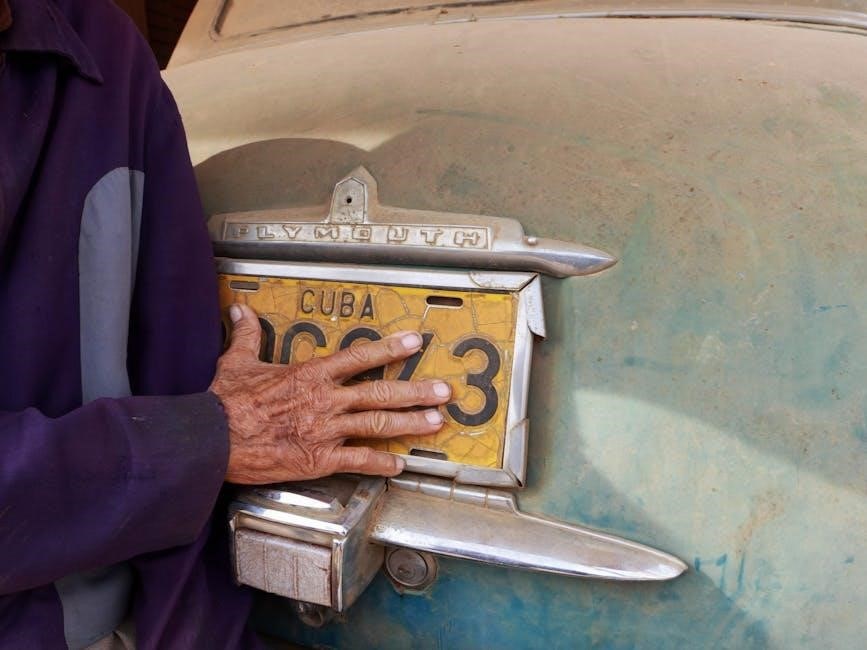aduana de cuba cantidad de artículos permitidos pdf
Cuban customs regulations outline specific import limits and permitted items to ensure compliance with national laws and avoid issues during entry. Understanding these rules is essential for travelers.
Overview of Import Limits and Permitted Items
Cuban customs regulations establish clear limits on imported goods to prevent commercial activities and ensure compliance with national laws. Travelers can bring up to 25 kg of personal effects duty-free, while other items are subject to a 1000-point system (equivalent to $2000 USD). Specific limits apply to certain goods, such as up to 3 telecommunications or computer accessories and up to 50 construction materials. Medications, hygiene products, and food are exempt from limits and taxes. Understanding these rules helps avoid customs issues and ensures a smooth entry process.
General Import Limits in Cuba
Travelers can import goods up to a total value of 1000 points (equivalent to $2000 USD). Personal effects are limited to 25 kg, duty-free.
Maximum Value of Imported Goods (1000 Points System)
Imports are capped at a total value of 1000 points, equivalent to $2000 USD. The first 50 points ($50 USD) are tax-exempt, while excess goods incur duties. Personal effects up to 25 kg are duty-free, with additional items subject to valuation. The 1000-point system applies to all non-commercial imports, ensuring compliance with Cuban customs regulations. Travelers must declare all goods accurately to avoid penalties, adhering to the established limits for a smooth entry process.
Weight Limit for Personal Effects (25 kg)
Travelers to Cuba are allowed to bring personal effects up to 25 kilograms without incurring customs duties. These items, such as clothing, shoes, toiletries, and personal accessories, are exempt from valuation. The 25 kg limit is strictly enforced, and exceeding it may result in additional scrutiny or fees. This allowance is separate from the 1000-point system, ensuring that essential personal items are admitted duty-free. Proper packaging and documentation are recommended to facilitate a smooth customs process.
Tax Exemptions and Payment Methods
Cuban customs offer tax exemptions for the first 50 points (approximately $50 USD) of imported goods. Excess imports require payment in dollars, ensuring compliance with regulations.
Exemption for the First 50 Points (50 USD)
The first 50 points (equivalent to $50 USD) of imported goods are exempt from customs duties for all travelers, including Cuban residents and foreigners. This exemption applies to non-commercial imports, ensuring a hassle-free experience for personal items. The exemption is automatically applied during the customs process, provided the total value does not exceed the specified limit. This policy aims to simplify entry for travelers while encouraging compliance with import regulations. Exceeding this limit will result in duty payments based on the item’s value and type.
Payment in Dollars for Excess Imports
Imports exceeding the 1000-point limit (equivalent to $2000 USD) are subject to customs duties, which must be paid in dollars. The payment method is based on the “value-peso” system, ensuring accurate calculation of duties for excess goods. This system, outlined in Resolution 175-2022, applies to all non-exempt imports. Travelers must declare excess items and pay the corresponding duties to avoid confiscation. Understanding this payment method is crucial for complying with Cuban customs regulations and avoiding potential penalties during entry.

Permitted Items and Their Quantities
Travelers can import up to 3 telecommunications or computer accessories, unlimited clothing, and up to 50 construction materials, adhering to Cuba’s customs regulations for personal use.
Telecommunications and Computer Accessories (Up to 3 Items)
Cuba permits the importation of up to three telecommunications or computer-related accessories, such as modems, Wi-Fi devices, or peripherals like mice and keyboards. These items must be for personal use and not exceed the 1000-point limit. Travelers should declare these items to avoid complications. Exceeding the limit may result in taxes or confiscation. Proper documentation, such as receipts, is recommended to prove the value and intended use. This policy aims to balance technological access with customs control, ensuring compliance with national regulations.
Clothing and Personal Effects (No Specific Quantity Limit)
Clothing and personal effects are permitted without specific quantity restrictions, allowing travelers to bring items like apparel, shoes, and personal care products. These items are generally exempt from duties and are not subject to the 1000-point limit. However, they must be for personal use and declared at customs. The 25 kg weight limit for personal effects applies, and these items must not be intended for commercial purposes. This policy simplifies travel for individuals while ensuring compliance with Cuban import regulations.
Construction Materials (Up to 50 Units)
Construction materials are permitted up to a maximum of 50 units per traveler. These items, such as tools or building supplies, must be declared at customs and are subject to specific tariffs based on their type and quantity. The 50-unit limit applies to non-commercial imports, ensuring personal use. This regulation helps regulate the influx of construction materials while allowing travelers to bring necessary items for personal projects. Proper documentation is required to avoid complications during customs processing.

Prohibited and Restricted Items
Prohibited items include drugs, psychotropic substances, and obscene materials. Restricted items are subject to confiscation or fines if not declared or exceed limits. Compliance is mandatory.
Drugs, Psychotropic Substances, and Prohibited Products
Drugs, psychotropic substances, and prohibited products are strictly banned and subject to confiscation. Items like marijuana and electronic cigarettes containing psychoactive substances, such as HHC, are seized. Exporting these items is illegal, and violations result in severe penalties, including fines and legal action. Travelers must avoid carrying such products to comply with Cuban laws and avoid customs issues.
Obscene or Pornographic Materials
Obscene or pornographic materials are strictly prohibited and subject to confiscation. Cuban customs regulations ban the importation of any items deemed offensive or harmful, including explicit content. Violations can result in fines and legal consequences. Travelers must ensure all materials comply with Cuban laws to avoid issues during entry. This restriction applies to all forms of media and is enforced rigorously to maintain cultural and moral standards.

Special Cases and Exemptions
Medications, hygiene products, and food are exempt from import limits, with no restrictions on quantity. Export regulations permit up to 50 cigars and $5,000 in cash duty-free.
Medications, Hygiene, and Food Products (No Limits)
Medications, hygiene products, and food items are fully exempt from import limits in Cuba. Travelers can bring these items without restrictions on quantity or value. This exemption applies to both Cuban citizens and foreign visitors, ensuring access to essential goods. The regulation aims to facilitate the importation of these necessities, with no additional taxes or documentation required beyond standard customs declarations. However, it is important to declare these items to avoid any potential issues during the customs process.
Export Regulations (e.g., Cigars and Cash)
Cuba allows the export of up to 50 cigars (or 23 individual units) duty-free, while larger quantities may require documentation. Travelers can export cash up to $5,000 (or equivalent in other currencies). Cigars are a popular export item, but quantities exceeding this limit may be subject to customs scrutiny. Exporting cash above the permitted amount requires declaration to avoid confiscation. These regulations ensure compliance with Cuban laws while allowing travelers to take home iconic products like cigars within specified limits.

Recent Updates to Customs Regulations
Cuban customs regulations have been updated with Resolution 175-2022 and 2024 changes, implementing the value-peso method and clarifying import limits for travelers. Compliance is essential.
2024 Updates to Import Limits and Values
The 2024 updates to Cuban customs regulations introduced the value-peso method for determining import values. The maximum import limit is now set at 1,000 points, equivalent to $2,000 USD. Personal effects up to 25 kg are exempt from duties, while additional items must not exceed the 1,000-point threshold. Telecommunications and computer accessories are limited to three items per traveler. Construction materials are capped at 50 units. These changes aim to streamline customs processes and align import regulations with current economic standards.
Resolution 175-2022 and Its Implications
Resolution 175-2022, issued by Cuba’s General Customs Administration, establishes reference values for imported goods in points. It sets limits on quantities and values for various items, impacting travelers and importers. The resolution aims to clarify customs procedures but lacks specific quantity details for certain goods, causing practical challenges for travelers. It emphasizes the 1,000-point limit for imports, with the first 50 points tax-exempt. This update reflects Cuba’s efforts to modernize customs regulations and align them with economic reforms while ensuring compliance with national laws.

Consequences of Non-Compliance
Non-compliance with Cuban customs regulations may result in fines, confiscation of excess goods, or legal actions, emphasizing the importance of adhering to import limits and declarations.
Fines and Confiscation of Excess Goods
Travelers exceeding import limits face fines and potential confiscation of goods. Excess items beyond the 1000-point system may be seized, with fines calculated based on the item’s value. Repeat offenses can lead to higher penalties. Prohibited items, such as drugs or restricted electronics, are strictly confiscated. Authorities prioritize compliance, ensuring adherence to declared values and quantities. Failure to comply may result in legal consequences, emphasizing the importance of accurate declarations and understanding import limits before arrival in Cuba.
Documentation Requirements
Accurate declaration of all imported items is mandatory. Travelers must present proper documentation, including invoices, receipts, and customs forms. Failure to provide required paperwork may result in delays or penalties. Customs officials may request additional documentation for high-value or restricted items. Ensuring all documents are in order before arrival simplifies the process. Non-compliance can lead to fines or confiscation of goods. Proper documentation ensures smooth clearance and avoids legal complications, making it essential for a hassle-free entry into Cuba.

Practical Advice for Travelers
Plan ahead by understanding import limits and required documentation. Pack items securely and declare all goods to avoid issues. Stay informed about prohibited items and customs rules to ensure smooth entry into Cuba.
Packing Tips for Avoiding Issues
Travelers should pack smartly, ensuring all items comply with Cuban customs regulations. Stay within the 25 kg limit for personal effects and avoid exceeding permitted quantities for electronics and construction materials. Declare all goods accurately to prevent fines or confiscation. Organize items clearly for easier inspection and avoid mixing prohibited or restricted goods with personal belongings. Keep essential documents, like receipts for high-value items, readily available. Check for updates on prohibited items, such as drugs or obscene materials, and ensure proper packaging to avoid issues at customs.
Understanding the Value-Peso Method
The Value-Peso method, introduced by Resolution 175-2022, combines the value and weight of imported goods to calculate duties. This system ensures fair assessment of miscellaneous items. Travelers must document the value of each item to avoid disputes. The total value of imports should not exceed 1000 points (equivalent to $2000 USD). The first 50 points are tax-exempt, while excess goods are subject to duties. Understanding this method helps travelers comply with regulations and avoid additional charges or confiscation. Proper documentation is key to a smooth customs process.
